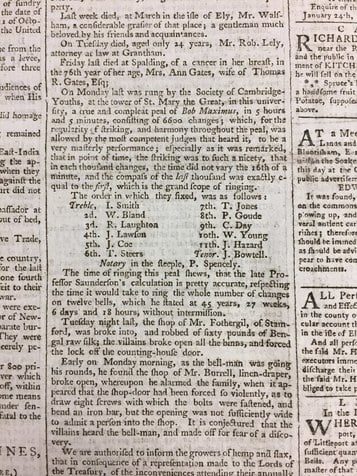Comments
-
Should we charge for requests for TV filming?My experience is that production companies are only too happy to pay for us not to ring but less so to film ringing itself. There is nothing like having hundreds of cast and extras waiting to shoot a scene to send a runner scurrying up the tower with an open wallet when the bells start ringing.
-
Advertising pealsI wonder how many young ringers would do this? Swaffham Prior in 1952. RW 22.11.1952
"A young band of some 12 or more is being taught and most of them sat in the ringing room the whole time of a recent peal. We hope they learned some-thing and that Swaffham Prior may become a bright spot in a somewhat barren district." -
Clarification/advice on change ringing for an academic projectHi Rob. The article appeared in the Cambridge Chronicle & Journal, Issue 1317, 19 January 1788. A copy is attached.

-
Clarification/advice on change ringing for an academic projectHere's an historical perspective.
Nicholas Saunderson was the Lucasian Professor of Mathematics. His 'Elements of Algebra' was published posthumously in 1740. One of the questions he posed for students was 'In what time may all the changes on 12 bells be rung, allowing 3 seconds to every change'. The answer he gave was '1437004800 seconds, or 23950080 minutes or 399168 hours or 45 years, 27 weeks, 6 days, 18 hours'.
In January 1788 the Cambridge ringers rang a peal of 6600 changes on 12 bells in 5 hours and 5 minutes. The newspaper report of the achievement said 'On Monday 21s was rung by the Society of Cambridge Youths, at the Tower of St Mary the Great, in this university, a true and compleat peal of Bob Maximus, in 5 hours and 5 minutes, consisting of 6600 changes; which for the regularity of striking, and harmony throughout the peal, was allowed by the most competent judges that heard it, to be a very masterly performance; especially as it was remarked, that in point of time, the striking was to such a nicety, that in each thousand changes, the time did not vary the 16th of a minute, and the compass of the last thousand was exactly equal to the first, which is the grand scope of ringing. The time of ringing this peal shews that the late Professor Saunderson’s calculations is pretty accurate, respecting the time it would take to ring the whole number of changes on twelve bells, which he stated at 45 years, 27 weeks, 6 days and 18 hours, without intermission'.
Gareth Davies

Start FollowingSend a Message
- Contact Us
- RingingForums Policy
- Terms of Service
- Useful Hints and Tips
- Sign In
- © 2025 Ringing Forums
